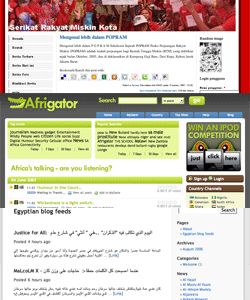Do new web applications benefit the poor?
I was curious when an article titled Web 2.0 can benefit the world's poor appeared on Scidev.net. The authors Waleed al-Shobakky and Jack Imsdahl see in new web applications, such as Google docs, a great potential for developing countries. They write, "Web 2.0 can help these students create documents, track their families' or villages' business affairs in spreadsheets and save and store data online. Users only need access to the Internet to benefit from these applications."
No doubt these applications will change the old concept of purchasing software for each computer. But what is the real benefit of having documents online? I think these applications have great potential to collaborate. But the article doesn't stress enough the "capacity crisis" that developing countries are facing in the context of information and communication technologies. In Africa problems of simple training to use computers, affordable access, and having enough bandwidth, need to be solved. Furthermore, these online applications need instant access to the Internet which is only available to a minority.
 A more helpful approach is open office, so people can work without an Internet connection. Another one is Jahazi, which has developed a USB flash stick full of applications. Also, Google wants to bridge this connectivity challenge with its latest tool called Gear, which will allow to work with online content while being offline.
A more helpful approach is open office, so people can work without an Internet connection. Another one is Jahazi, which has developed a USB flash stick full of applications. Also, Google wants to bridge this connectivity challenge with its latest tool called Gear, which will allow to work with online content while being offline.
But what strikes me the most about the article is that it leaves out the biggest opportunities about web2.0 and development. The potential lies in its users and what they do with these tools to communicate, share knowledge and create social media. New social networks are established online, which facilitate interaction and collaboration in an unprecedented way. Blogs, wikis or free sources are the drivers of web2.0.
The authors see language as an obstacle, but on the contrary, I believe that web2.0 with its open source dimension offers software in all kinds of languages (e.g. wordpress and drupal). This is a key factor to create own communities in local or regional contexts (e.g. the union of the Urban Poor from Indonesia, Afrigator, Egypt blog review). However, to which extent this can benefit the poor, will be further discussed on the web2fordev conference.